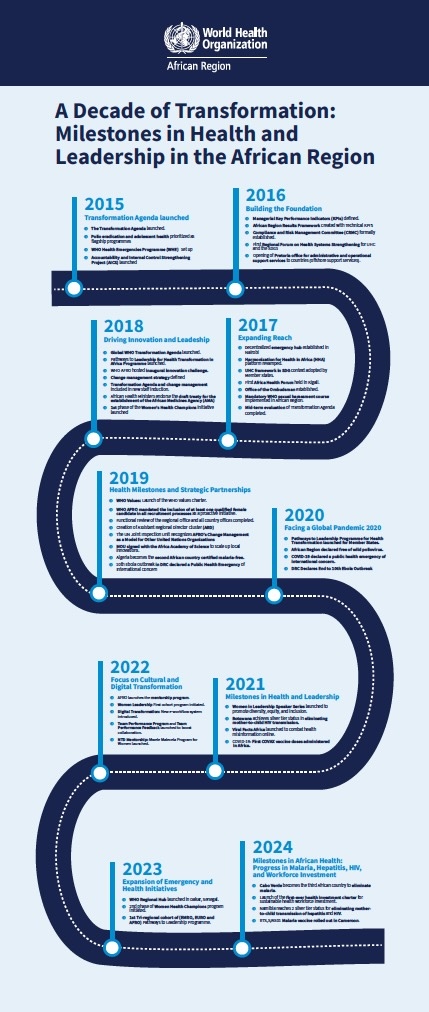 Credit: UNEERO / Martine Perret
Credit: UNEERO / Martine PerretTransformation Agenda
“We are determined to help accelerate the building of resilient health systems that prevent and manage disease and assure health security and improve the health and well-being of the people in the WHO African Region.”
- Dr Matshidiso Moeti, WHO Regional Director for Africa
Our Vision for Change
Launched in 2015, the Transformation Agenda of WHO in the African Region is a vision and strategy for change aimed at facilitating the emergence of an appropriately resourced, equipped and accountable WHO that is responsive to the needs and expectations of its Member States and effective in performing its core functions. It aims to strengthen WHO’s leadership in the transformation of the health and well-being of the people in Africa.

Impetus for Change:
Health Context in 2015
Change Management
Framework and Architecture
In order to channel our efforts and to closely align with specific outcomes of the WHO reform programme, four focus areas were identified and a phased implementation approach adopted.
Focus Areas
The Transformation Agenda has four focus areas: pro-results values, smart technical focus, responsive strategic operations and effective communications and partnerships. The managerial, programmatic and governance themes of the ongoing WHO global reform were factored into its development. It is not only a commitment to positive change in the Regional Office but also a programme for accelerating the implementation of WHO global reform within the Region, with each focus area closely aligned with specific outcomes of the WHO global reform programme.

Pro-results values
Foster the emergence of an institutional culture defined by the values of excellence, teamwork, accountability, integrity, fairness, innovation and openness.

Smart Technical Focus
Better serve Member States by focusing on country priorities in line with sustainable development objectives, country cooperation strategies and the programme budget.

Responsive Strategic Operations
Improve the effectiveness of support functions by ensuring adequate alignment of funding and resource allocation with priorities.

Effective Communications and Partnerships
Communicate effectively both internally among staff members and externally with stakeholders, build lasting relationships and enhance transparency and trust.
Phased Implementation Approach
Launch of
Transformation
Agenda 2015

Phase 1
(2015 - 2017) Becoming the WHO
stakeholders want
and deserve

Phase 2
(2018 - 2020) Putting people at
the center of change

Phase 3
(beyond 2021) Institutionalization
of change

In Phase I (2015 – 2017), a change management strategy was defined to achieve the Region’s vision for change across four strategic priority areas. Strategic actions were implemented across the four Transformation Agenda pillars aimed at delivering results at country level, changing organizational culture and changing the Secretariat’s external engagement model and communications within the region. The AFRO and Global Transformation programs became a standing item at all Executive Management and Management Development Committee meetings contributing to an internalization of WHO’s global and regional vision for change and new corporate values.
Phase II (2018 – 2020) of AFRO Transformation Agenda was launched in 2018 and places staff at the center of change to drive forward meaningful improvements in health in the African Region. It placed organizational emphasis on promoting a healthy, respectful and fair workplace; continuously engaging staff members and enhancing their commitment to change towards effective delivery for quality results. It emphasizes holding people and teams accountable and defines change initiatives across seven priority workstreams proposed by the AFRO Regional Change Network: WHO Values/Competencies and Staff Engagement; Workplace and staff wellbeing; Country Focus and WHO Repositioning; Efficiency, Accountability and Quality; Knowledge Management and internal Communications; Stakeholder Engagement and Partnerships; Results Based Management (RBM) and Value for money.
Phase 1–2 Achievements
Transformation Agenda
Governance Structure
To ensure successful implementation of the Transformation Agenda, a three-level governance structure was established whose key functions include: strategic guidance, priority setting, accountability in implementation, championing change at country level and monitoring and evaluation of transformation initiatives.
Executive
Leadership-Responsible for oversight, priority setting, strategic advice and strategic decision making on issues related to the planning, funding and implementation of the TA. They support the Change Network by communicating key messages to the team members in their clusters.
Management
Development
Committee-The Management Development Committee discusses the coordination of the TA activities of WHO AFRO clusters and common issues, in order to ensure that the implementation of the AFRO Transformation Agenda is efficient and effective. The MDC harmonizes implementation of the AFRO Transformation Agenda by the different business owners, reviews documents on the AFRO Transformation Agenda submitted to the Regional Committee and monitors implementation of transformation flagship programmes.
Regional
Change Network-Recommend cross-cutting change activities to increase buy-in and synergies, champion change at country and regional levels, implement change activities within the six workstreams, facilitate open communication on change, identify and address potential sources of resistance to change, act as an ad-hoc advisory group to propose effective approaches to make change sustainable.
Change Management TeamResponsible for fostering implementation of the change management strategy, designing change initiatives, supporting change agents in implementing change activities, monitoring of TA activities and reporting progress in TA implementation throughout the Secretariat.



